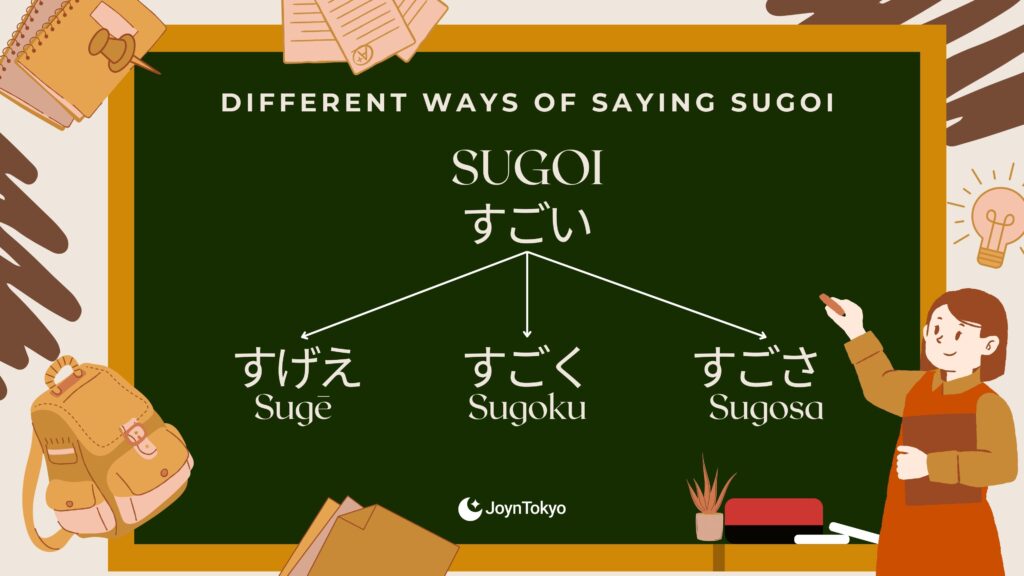Japanese is full of expressions that carry more nuance than a direct dictionary translation can capture. One of the most widely recognized words is sugoi (すごい). You may have heard it in anime, Japanese dramas, or everyday conversations, but what does sugoi mean, and how is it used? This guide explores its meaning, variations, and cultural context so you can use it naturally in conversation.
The Basic Meaning of Sugoi
At its core, sugoi translates to amazing, incredible, or awesome in English. It is often used to express admiration or surprise at something impressive. For example, when you see a beautiful view, taste delicious food, or hear an impressive story, a natural Japanese reaction would be to say, Sugoi!
Interestingly, the word originally had a negative nuance centuries ago, closer to meanings like “terrifying” or “dreadful.” Over time, its connotation shifted to positive amazement, though it can still lean either way depending on tone and context.
Everyday Uses of Sugoi

In modern Japanese, sugoi is one of the most versatile exclamations. People say it in casual chats among friends, in work settings, and even in media advertisements. Depending on tone, it can mean:
- Admiration: “That’s amazing!” (Sugoi ne!)
- Surprise: “Wow!” (Eeh, sugoi!)
- Intensity: Describing something as very large, fast, or extreme.
Because of its broad use, sugoi is considered a safe and friendly word for learners of Japanese to adopt early.
What Does Sugoi Dekai Mean?

The phrase sugoi dekai (すごいでかい) combines sugoi with dekai, which means huge or enormous. Together, the phrase can be translated as “super big” or “incredibly huge.”
In pop culture, especially anime and manga, sugoi dekai is sometimes used humorously or dramatically when a character emphasizes someone’s size, strength, or even body proportions. For learners, it’s helpful to know this phrase because it appears often in casual and exaggerated expressions.
Variations of Sugoi in Japanese

The word sugoi has several related forms that appear in casual conversations, media, and written Japanese. Each variation adjusts the meaning slightly, allowing speakers to express admiration, intensity, or abstract qualities in different ways. Learning these forms helps you understand Japanese more deeply and use the right expression for the right context.
Sugē (すげえ)
This form is a slangy, masculine version of sugoi often used in casual conversations, anime, and manga. You will typically hear it among male speakers or characters trying to sound tough, laid-back, or expressive. While it carries the same meaning of “amazing” or “awesome,” it is not considered polite, so it should only be used with friends or in informal settings. Foreign learners often pick it up from pop culture, but it’s best to use it carefully to avoid sounding rude in professional or formal conversations.
Sugoku (すごく)
Sugoku is the adverbial form of sugoi, meaning “very” or “extremely.” Instead of standing alone as an exclamation, it modifies adjectives or verbs to intensify their meaning. For example, sugoku atsui means “very hot,” and sugoku tanoshikatta means “it was extremely fun.” This form is polite enough for general use, making it a safe choice for learners to adopt in daily conversations. It appears frequently in written Japanese as well as spoken language, so mastering it is useful for both casual chats and formal communication.
Sugosa (すごさ)
Sugosa is the noun form of sugoi, referring to the “greatness” or “amazingness” of something. Unlike the exclamation sugoi, which reacts in the moment, sugosa often appears in descriptive speech or writing when someone explains the impressive qualities of a person, place, or achievement. For example, 富士山のすごさは言葉で言い表せない means “The greatness of Mount Fuji cannot be expressed in words.” This form is less common in everyday conversation, but it adds depth and nuance in more reflective or descriptive contexts.
Cultural Nuances Behind Sugoi
In Japanese culture, words like sugoi help maintain positive interactions. Complimenting achievements, showing enthusiasm, and reacting with amazement are ways to strengthen social bonds. Saying sugoi at the right time can make you sound more engaged and appreciative in conversations, which is valued in Japanese communication.
At the same time, tone matters. A flat or sarcastic sugoi could sound insincere, while an excited one conveys genuine admiration. Observing how locals use it in real conversations is the best way to develop an ear for its natural rhythm.
Examples of Sugoi in Sentences
Here are some practical examples to help you use sugoi correctly:
| Romaji | Romaji | Meaning |
|---|---|---|
| Kare no nihongo wa sugoi ne. | 彼の日本語はすごいね。 | “His Japanese is amazing.” |
| Kono keshiki wa sugoku kirei desu. | この景色はすごくきれいです。 | “This scenery is very beautiful.” |
| Ano senshu no supīdo wa sugoi. | あの選手のスピードはすごい。 | “That athlete’s speed is incredible.” |
By practicing with examples like these, you’ll quickly find yourself using sugoi naturally.
When Not to Use Sugoi
Although it is versatile, sugoi can sometimes feel too casual in very formal contexts. In situations like business meetings or addressing someone of much higher status, alternatives such as subarashii (素晴らしい) or kandō-teki (感動的, moving/inspiring) might be more appropriate. These carry a more polished tone and avoid sounding overly casual.
Sugoi Overview
So, what does sugoi mean? It is a flexible word that captures amazement, admiration, and intensity in Japanese conversation. Phrases like sugoi dekai add even more emphasis, making it useful for both everyday speech and pop culture contexts. By paying attention to tone and setting, you can use sugoi to sound more natural and engaged in Japanese.
It is more than just a catchphrase from anime, it’s a window into how Japanese speakers express excitement and appreciation in their daily lives.









